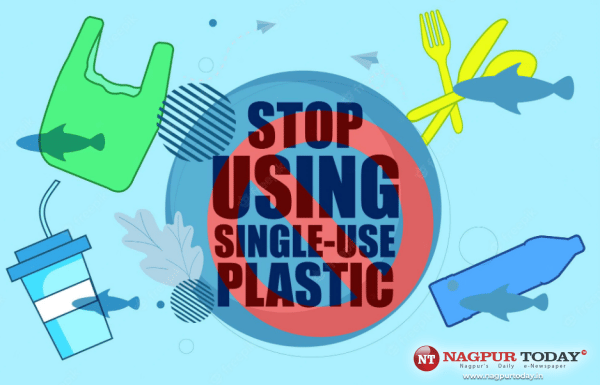
Nagpur: Come July 1, single-use plastic items will no longer be allowed across the country from July 1. The Central Pollution Control Board had earlier in the year notified producers, shopkeepers, street vendors, and the general public about the ban on such items that the government considers single-use plastic.
The prohibited plastic items include earbuds, flags, candy, and ice-cream sticks, decorative thermocol, PVC banners less than 100 microns thick, stirrers, wrapping films, cups, glasses, and cutlery, among others.
Nagpur Municipal Corporation’s Nuisance Detection Squad (NDS) will take action against banned plastics in the city from July 1, said Additional Municipal Commissioner Ram Joshi on Thursday.
The Union Ministry of Environment, Forests and Climate Change issued a notification on August 12, 2021 to completely ban production, import, storage, distribution, sale and use of single-use plastic material from July 1, 2022.
The action will be taken accordingly, which was decided in a meeting convened by Joshi and attended by Nuisance Detection Squad chief Virsen Tambe, Superintending Engineer Manoj Talewar, and Deputy Municipal Commissioner Dr Gajendra Mahalle among others.
According to NMC, all shops, markets, establishments, trade associations etc in the city should inform the Municipal Corporation if they have any prohibited plastic stocks. The NDS team from 10 zones will carry out a crackdown on markets, shops and establishments. In this case, if any use, flow and storage of prohibited plastic material is found, punitive action will be taken, warned the civic body.
Around 43% of plastic is used for packaging and most are single-use, according to a fact sheet released by the Environment Ministry and the Energy and Resources Institute (TERFI), a think tank. Per capita plastic use in India is about 9.7kg, mostly packaging material.
Single-use plastic contaminates soil and water, chokes waterways and worsen natural disasters. Plastics block sewage systems and provide breeding grounds for mosquitoes, and release toxic chemicals and emissions when burned.
















